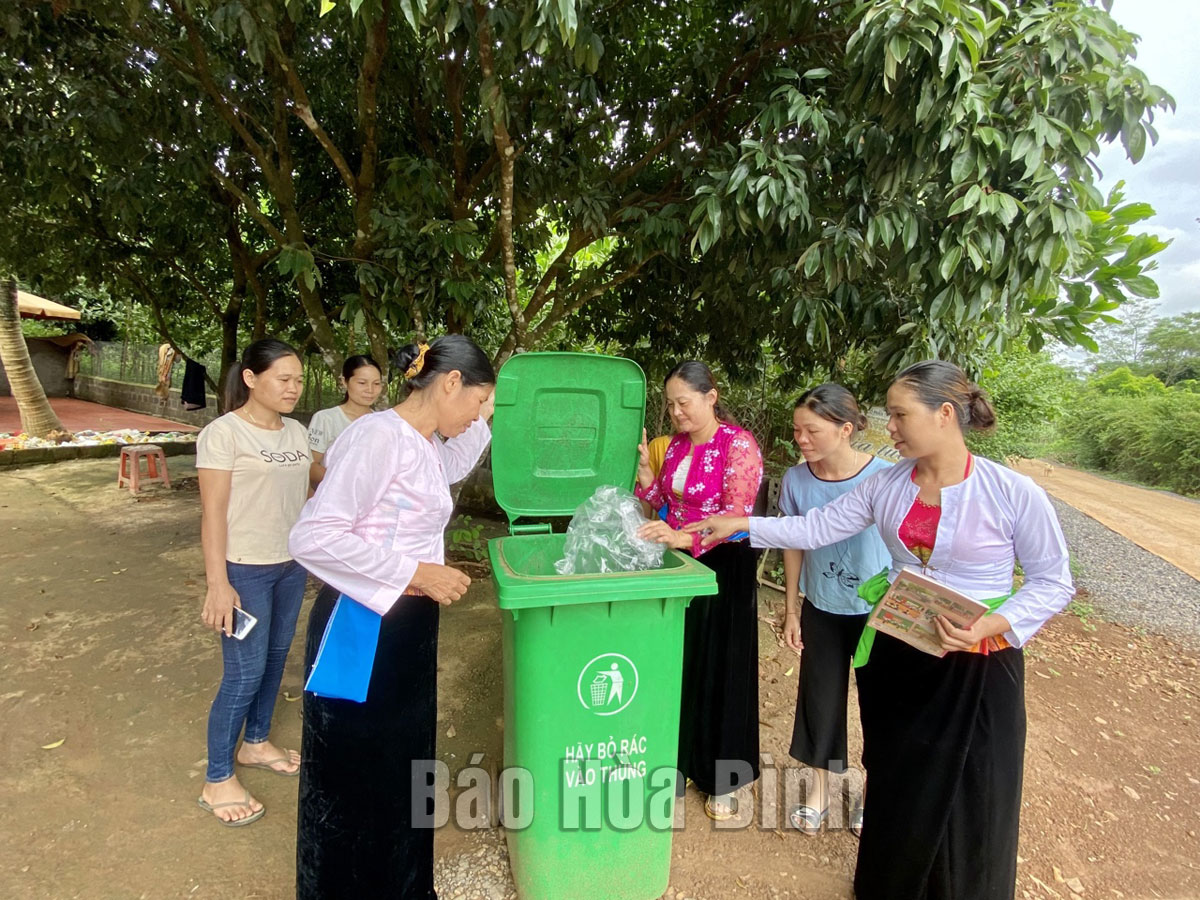
(HBO) - Criteria No. 17 related to the environment was identified by Lac Son district as important content, especially for communes striving to meet new rural standards. To achieve the target, it is necessary to mobilise the participation of the whole political system, agencies, business community and the people.
The Women's Union of Van Son commune
(Lac Son District) calls on its members of Loi Muong hamlet to collect and
treat domestic waste at the right place.
This year, the district will continue to promote dissemination to enhance
awareness of the people, authorities and mass organisations.
People are encouraged to take measures to clean the environment in their
residential areas, along with the mobilization of the private sector in
environmental protection and investing in the construction of a centralised
waste treatment area among communes. The "All people unite to build a
cultural life" movement is carried out along with the realisation of
village conventions on rural environmental protection. People are
encouraged to lead a civilised life and cultural family as well as develop
production and animal husbandry in association with environmental protection.
Bui Thanh Tung, Vice Chairman of the district People's Committee, said the
district focuses on disseminating legal documents to fulfil criteria No 17 and
new rural buildings in the management of environmental protection. Businesses,
production and business establishments in the area are facilitated in the
observation of environmental protection regulations.
Up to now, the rate of households using hygienic and clean water has reached 98
percent. The percentage of businesses, aquatic farms and craft villages that
meet regulations on environmental protection is 65 percent. Solid waste and
wastewater in residential areas, production and business establishments have
been collected and treated in line with regulations.
Implementing environmental criteria No. 17, the district has 75 percent of
households with hygienic toilets. Seven out of 24 communes are assessed to
satisfy the criteria for waste treatment. Seven communes have fulfilled the
criteria set for new-style rural areas. The district is striving to have
two more communes meeting the criteria by the end of this year, namely Tan Lap
and Yen Phu.
Hoa Binh province is undergoing a dynamic transformation amid Vietnam’s national digital transition. Building on Poliburo’s Resolution No. 57-NQ/TW on breakthroughs in science, technology, innovation, and national digital transformation, the province has rolled out a wide range of practical action plans. A standout initiative is the "Digital Literacy for All” movement, an effort to ensure that no one is left behind in the digital era.
Hoa Binh province is undergoing a dynamic transformation in the wake of the national digital transformation movement. Building on Resolution No. 57-NQ/TW of the Politburo on breakthroughs in science, technology, innovation, and national digital transformation, the province has implemented a wide range of practical action plans. A standout initiative is the "Digital Literacy for All” movement ambitious effort to ensure that no one is left behind in the digital age.
With a spirit of unity and proactive problem-solving, the Party Committee, the government and the people of Dong Lai Commune (Tan Lac District) have made great strides in implementing the resolutions of the 24th Party Congress of the commune for the 2020 - 2025 term. Focusing on leadership and practical actions, the commune has brought the Party’s resolutions into daily life, creating strong impacts and pushing the local development forward.
Amid the nationwide push for digital transformation, young people in Hoa Binh Province are stepping up as dynamic pioneers, applying technology to enhance Youth Union operations and expand the reach of youth-led initiatives. Through creativity and adaptability, Youth Union organizations at all levels have introduced a series of practical solutions, contributing to modern governance and community development.
In recent years, An Nghia commune, located in Lac Son district, has stepped up administrative reform, focusing on improving the quality and efficiency of its single-window service unit for receiving and processing administrative procedures. These improvements have helped create favourable conditions for local residents and organisations to handle administrative procedures, contributing to the commune’s broader socio-economic development.
The Prime Minister-approved master plan to develop the multi-use value of forests ecosystems through 2030, with a vision to 2050, aims to improve the management and sustainable use of forest resources, create jobs, increase incomes, and improve the living standards of ethnic minorities, people in mountainous and remote areas, forest workers and those living near forests.



